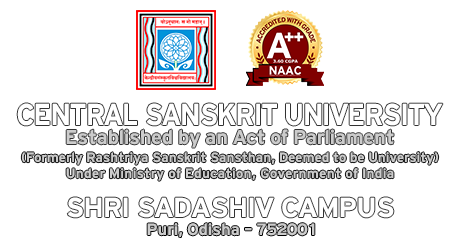From the beginning of the establishment of this institution as Puri Sanskrit College in 1918; The department of Advaita Vedanta is continuing till today. After the transformation of the institution into Shree Sadashiva kendriya Sanskrit Vidyapeetha in 1971, an integral changes of the department have done. Many national level scholars like Pt. Bhajakrishna Misha(Vedanta Bageesha), Dr. B. Kutumbashastri were teaching the Advaita Vedanta. And many national level scholars like Dr. B.N Mishra, Dr. Pravat Ranjan Mohatra are manifested by the Department. Moreover the students number is gradually increase year by year.
- The Philosophy Program promotes the development of the person as an individual and as a meaningful contributor to society. Towards that end, the following goals and objectives have been established. In general, critical analysis defines the general nature and purpose of philosophical inquiry.
Our Goals
- "Philosophy" is a compound of two Greek elements, namely, "philo," meaning "loving" and "sophia," meaning "wisdom." Philosophy, then, means the love of wisdom. What, however, constitutes the love of wisdom?
- The wisdom that is loved focuses, in part, on answers to the ultimate questions relating to the nature and meaning of life. The primary goal of philosophy courses, then, is to address some of those ultimate questions so as to enable to students to lead a more substantive and meaningful life. Secondarily, philosophical reflection on the ultimate questions should lead to reasoned foundations conducive to support for human values; to an awareness of a duty to work for justice, compassion, and peace; and to the integrated and rich human life worth living, thus providing students the abilities and opportunities to be more responsible for the interdependent world in which they find themselves.
Our Objectives
By active participation in class discussions and by excellence evidenced in examinations and term papers, students are expected to achieve the following:- clarity and coherence in explaining philosophical concepts, theories, and policies;
- ability to criticize assumptions and arguments;
- ability to evaluate the adequacy and justifiability of concepts, theories, and policies;
- ability to synthesize results of critical reflection and judgment into personal positions on issues studies;
- ability to analyze terms for vagueness and ambiguity;
- acceptance of self and others with tolerance and understanding.

Prof Sambhunath Mahallik Professor |
| Sl.No. | Name | Designation | Profile Details |
| 1 |

Prof Sambhunath Mahallik |
Professor |  |
| 2 |

Dr. Bhagaban Samantray |
Professor |  |
| 3 |

Dr. Ajay Kumar Gandha |
Asst. Professor |  |
| 4 |

Dr Bibhudatta Mishra |
Guest Faculty (Assistant Professor Grade) |  |
| 5 |

Mr. Dipankar Talukder |
Guest Faculty (Assistant Professor Grade) |  |








 Instagram
Instagram